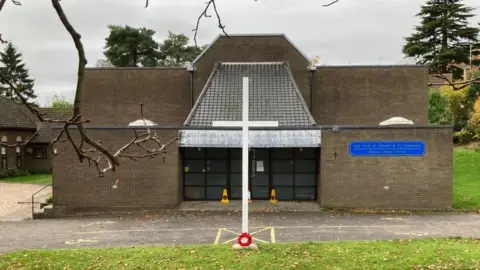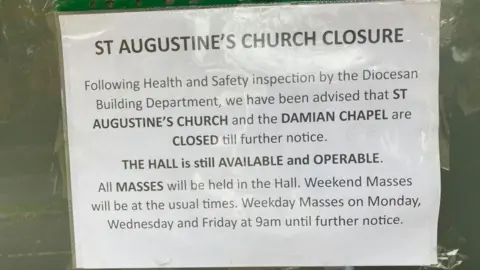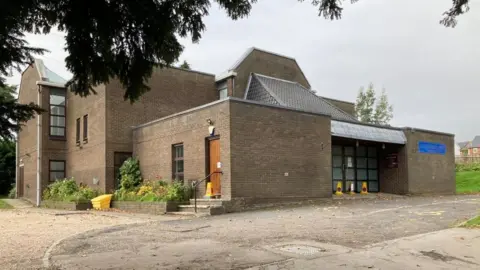Collapse-prone concrete forces Daventry church closure
 Martin Heath/BBC
Martin Heath/BBCA church has been closed following the discovery of the collapse-prone concrete Raac in the building.
Services are being held temporarily in the hall next to St Augustine's Catholic Church in Daventry, Northamptonshire.
The Diocese of Northampton said the closure of the building was the result of "an abundance of caution".
Further investigation work at the church is due to take place later this week.
Reinforced autoclaved aerated concrete (Raac) is a lightweight material that was used mostly in flat roofing, but also in floors and walls, between the 1950s and 1990s. It was considered a cheaper alternative to standard concrete.
The Health and Safety Executive warned earlier this year that Raac was now beyond its 30-year lifespan and might "collapse with little or no notice".
Neil Roseman, from the Diocese of Northampton, said: "On Friday, 17 November, our diocesan building surveyor accompanied a specialist roofer to undertake an initial inspection on the roof of St Augustine's Catholic Church.
"During this work, the presence of Raac was confirmed.
"Out of an abundance of caution, the diocesan team, in partnership with the parish, decided to close the church building, allowing for further investigative work to take place."
The work is due to start on 24 November.
 Martin Heath/BBC
Martin Heath/BBCThe unusually-shaped church of Our Lady of Charity and St Augustine was opened on the site of an old pub on London Road in 1972.
It was extensively remodelled in the 1980s and a hall was added next to it.
The interior was redesigned again and the ceiling was replaced in 2017.
 Martin Heath/BBC
Martin Heath/BBCParts of three schools in Northamptonshire were closed in September amid fears that Raac was present. One of them, Moulton Primary School, later announced that no Raac had been found.
The Royal and Derngate Theatres in Northampton cancelled performances in September following discovery of Raac in the foyers, but both auditoriums have now reopened.

Follow East of England news on Facebook, Instagram and X. Got a story? Email [email protected] or WhatsApp 0800 169 1830
